Private Internet Access Review: Quick Expert Summary
Private Internet Access (PIA) is one of the fastest and most user-friendly VPNs on the market. It comes with unlimited connections, fully open-source apps, and some of the strongest security and privacy features out there, including a no-logs policy, which has been independently audited and also proven true in court documents.
In addition, PIA offers more extra features than most other VPNs, including:
- Split-tunneling — Allows you to choose which apps use the VPN and which apps and IP addresses bypass it.
- PIA MACE — A really good ad blocker that gets rid of ads and protects you from malicious sites.
- Obfuscation — Makes VPN traffic look like regular internet traffic.
- RAM-only servers — Only saves data to the RAM, which provides better security since all data is wiped after every server reboot.
- Perfect forward secrecy — Regularly changes the encryption key for each VPN session to prevent hackers from using compromised keys from past or future sessions to spy on your online activities.
- Dedicated IP addresses — Allows you to get an IP address that only you can use.
- Full leak protection — The VPN apps provide protection against IPv6, DNS, and WebRTC leaks.
- And more…
PIA is a good VPN for streaming and gaming. It works with 30+ streaming platforms, including 7+ Netflix libraries as well as other popular apps like Hulu, Amazon Prime, Disney+, and BBC iPlayer. And it provides stable ping and protection against DDoS attacks for safe online gaming.
It’s also one of my top choices for torrenting — it allows torrenting across all of its servers, works with all top P2P apps, allows port forwarding, and even has SOCKS5 proxy support.
But there’s one issue that stops PIA from being the best VPN out there — a lot of its live chat agents aren’t very helpful, which makes it pretty frustrating to use at times.
Overall, PIA is one of the top VPNs out there. It’s secure, easy to use across all apps and platforms, and it also allows for unlimited simultaneous connections on one account (unlike most VPNs that only allow for 5–10 simultaneous connections).
Private Internet Access has 1-month, 6-month, and 2-year payment plans (the 2-year plan often comes with additional months for free). All plans are covered by a 30-day money-back guarantee.
| 🏅 Overall Rank | #2 out of 82 VPNs |
| 🌍 Countries With Servers | 91 |
| 📱 Number of Devices | Unlimited |
| 💸 Starting Price | $2.03 / month |
| 🎁 Free Plan | ❌ |
| 💰 Money-Back Guarantee | 30 days |
Try Private Internet Access (30 Days Risk-Free)
Private Internet Access Full Review — High-End Security & Privacy Features (One of the Best VPNs in 2025)
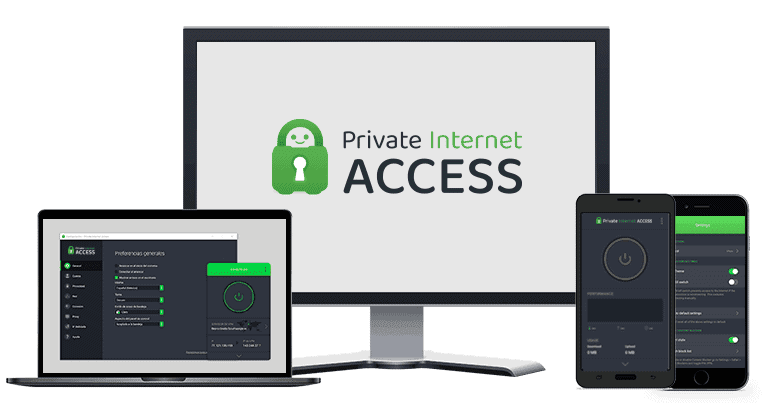
I spent a couple of weeks testing and researching Private Internet Access (PIA) to see whether or not it’s actually one of the top VPNs out there. Based on my experience with the VPN, it’s definitely one of the best I’ve ever tested.
PIA provides great value because it has excellent security features. On top of all industry-standard and advanced security tools, it comes with the best VPN ad blocker on the market (PIA MACE), an excellent split-tunneling tool, and an obfuscation feature that works well in restrictive countries like China and on restricted networks like school and work networks.
PIA also supports Tor traffic and allows you to buy dedicated IP addresses to bypass annoying CAPTCHAs.
It’s pretty great for streaming and excellent for torrenting. It works with dozens of the most popular streaming platforms, including Netflix, Amazon Prime, Disney+, and tons of smaller national platforms, too. PIA allows P2P traffic on all servers, we never had any problems using it with torrent clients, and PIA has SOCKS5 proxy servers and port forwarding, which I used to boost my torrenting speeds.
PIA had excellent speeds in my speed tests, which allowed me to stream content in HD without any buffering (even while connected to distant servers), download torrent files quickly, and browse the web without interruptions.
It has intuitive apps, so it’s a good pick for beginners, but what I really like is that it’s highly customizable, so advanced users can tweak settings to optimize their connections for specific purposes.
Finally, it’s one of the cheapest VPNs on the market. Additionally, you can take advantage of our exclusive 83% discount on your subscription and get multiple months free. All PIA plans are backed by a risk-free 30-day money-back guarantee.
Private Internet Access Plans & Pricing — Cheap Plans & Excellent Value

PIA offers really affordable payment plans. It has a 1-month, 6-month, and 2-year plan (the 2-year plan offers the best savings and often comes with free additional months). With plans that start at $2.03 / month, PIA is one of the cheapest VPNs on the market.
PIA is cheaper than ExpressVPN, which is the #1 VPN on the market, but you still need to commit to a 2-year subscription to get the best deal.
You get unlimited simultaneous connections with 1 subscription, which is above the industry average of 5–10 connections. This makes this provider an excellent choice for large families or people who want to secure tons of devices.
You can also add PIA’s antivirus to your plan, which protects you from malware attacks. It does this by patching vulnerabilities in your computer’s defenses and isolating any threats on your system — giving you the ability to choose whether you want to keep them in quarantine or delete them. It also protects you from potentially dangerous ads, trackers, and websites. I really like how you can perform quick or full scans of your entire computer, schedule scans, and even see a history of previous scans (which includes the scan results).
PIA accepts credit/debit cards, PayPal, Amazon Pay, and cryptocurrencies. You can purchase a subscription with Visa, Mastercard, American Express, and Discover, and pay with Litecoin, Bitcoin, Bitcoin Cash, Wrapped Bitcoin, Dogecoin, Shiba Inu Coin, Apecoin, Euro Coin, Polygon, Ethereum, and USD-pegged stablecoins via BitPay.
PIA also backs all plans with a 30-day money-back guarantee, which is really great.
Private Internet Access Features — Essential Security Tools + Tons of Extras
PIA comes with all of the standard security features, like:
- Multiple encryption options. PIA offers 256-bit AES encryption and 128-bit AES encryption. 256-bit AES is more secure, but 128-bit AES has slightly faster speeds (it was 4-5% faster in my tests).
- No-logs policy. PIA doesn’t track, store, or log any browsing data, and this has been repeatedly proven to be true in court (unlike most other VPNs that have not been legally tested).
- Kill switch. This feature protects you from possible data leaks by shutting down your internet access if your VPN connection drops.
PIA has a built-in kill switch on its iOS app (many VPNs don’t have a kill switch on iOS), and there’s an Advanced Kill Switch option on Windows and Mac, which disables internet access if you’re not connected to a VPN server — I tested this by trying to access the internet without being connected to PIA’s servers, and it successfully prevented me from doing that. I like this flexibility, as it prevents you from accidentally accessing the web without securing your connection with the VPN first. Top competitors like ExpressVPN don’t provide such flexibility via their kill switches — and Surfshark has something similar, but only on Windows.
I also think it’s great that PIA’s servers run on RAM memory. This means PIA doesn’t store any data on a hard drive, and all of the data on the server is erased when the server is rebooted. What’s more, the provider uses perfect forward secrecy, which changes the encryption key for each VPN connection so that hackers can’t endanger user data by compromising past or future encryption keys.
Plus, I like how you get complete protection against DNS, IPv6, and WebRTC leaks — some top VPNs like VyprVPN and PrivateVPN only protect you against certain types of leaks. I ran leak tests while connected to servers in 15+ countries, and the VPN never leaked my data. I also like how PIA provides convenience by allowing you to perform IPv6 and DNS leak tests on its site — the tests are accurate, but the results are less detailed than what you get with third-party leak test tools.
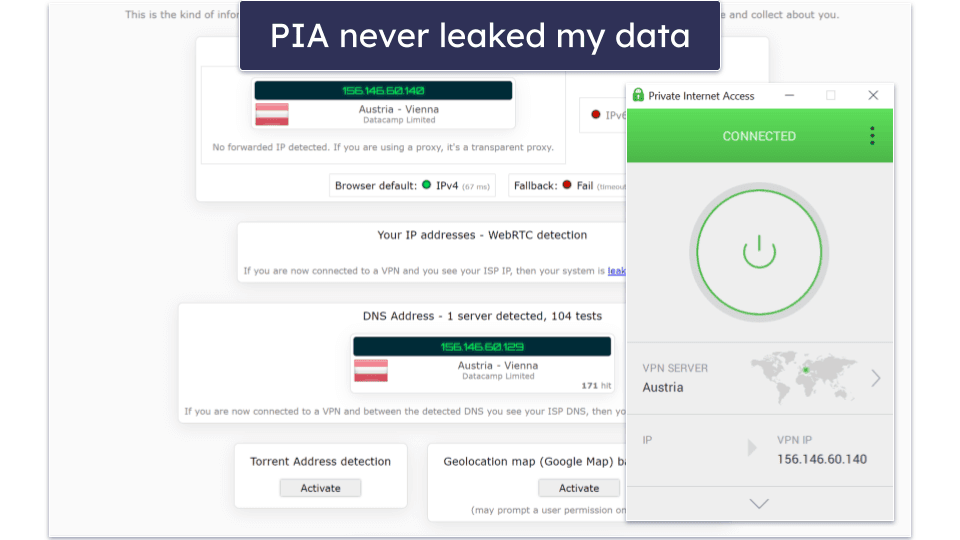
PIA offers 3 very secure and fast VPN protocols:
- WireGuard. WireGuard is one of the fastest and most secure protocols on the market, and it’s available on all PIA apps. What I like the most about it is that if you move between networks (like between cellular and Wi-Fi), the VPN doesn’t need to re-establish the connection to the VPN tunnel. In my tests, WireGuard provided faster speeds than OpenVPN and IKEv2/IPSec.
- OpenVPN. OpenVPN is an open-source protocol that has undergone a lot of testing, so it ensures secure connections. While it delivers pretty fast speeds, in my tests, it was slower than WireGuard by about 30%. All PIA apps support OpenVPN.
- IKEv2/IPSec. This protocol offers solid security and good speeds, and it’s pretty adaptable to network changes. That said, it’s slower than WireGuard and OpenVPN and only available on the iOS app.
| Android | iOS | Windows | macOS | Linux | Apple TV |
|
| WireGuard | ✅ | ✅ | ✅ | ✅ | ✅ | ❌ |
| OpenVPN | ✅ | ✅ | ✅ | ✅ | ✅ | ✅ |
| IKEv2/IPSec | ❌ | ✅ | ❌ | ❌ | ❌ | ✅ |
PIA comes with a couple of extra security and privacy features, including:
- Split-tunneling
- PIA MACE (Ad Blocker)
- Multi-Hop (Traffic obfuscation)
- Smart DNS
- Dedicated IP Addresses
- Identity Guard
- Tor Support
Split-Tunneling — Exclude Apps & Websites From the VPN Tunnel

PIA’s split-tunneling feature is better than most other VPNs’ split-tunneling functions, as it lets you choose which apps use or don’t use the VPN, and which IP addresses bypass the VPN (both IPv4 and IPv6 are supported). Split-tunneling is available on Android, Windows, macOS, and Linux. It’s not available on iOS, but most VPNs don’t have split-tunneling on that platform — TunnelBear is one of the only ones that do. But I think it’s really great that you get this feature on macOS, as only very few VPNs (like ExpressVPN) have split-tunneling for Macs.
The desktop apps let you split-tunnel both apps and websites, while the Android app only lets you split-tunnel apps. You can also choose to split-tunnel your DNS traffic differently. The VPN DNS Only option routes all DNS requests through PIA’s servers regardless of any app-specific setting, which improves your privacy by preventing DNS leaks (but only on Windows and Linux devices). That’s still better than top competitors like ExpressVPN, which only let you split-tunnel app traffic across all platforms.
During my tests, PIA’s split-tunneling worked perfectly. I tested split-tunneling while I downloaded files — I routed my Brave traffic through the VPN and excluded my Microsoft Edge traffic. When I checked my IP address, I saw my VPN’s IP address on the Brave browser and my actual IP address on the Edge browser. I also excluded my Facebook traffic and my bank’s IP address for the test, and I was able to use my location for Facebook and visit my bank’s website without any issue — most banks don’t allow VPN traffic.
Overall, PIA’s split-tunneling function works great. It lets you redirect both apps and website IP addresses, and I really like that it’s also available on macOS.
PIA MACE (Ad Blocker) — It’s the Best on the Market
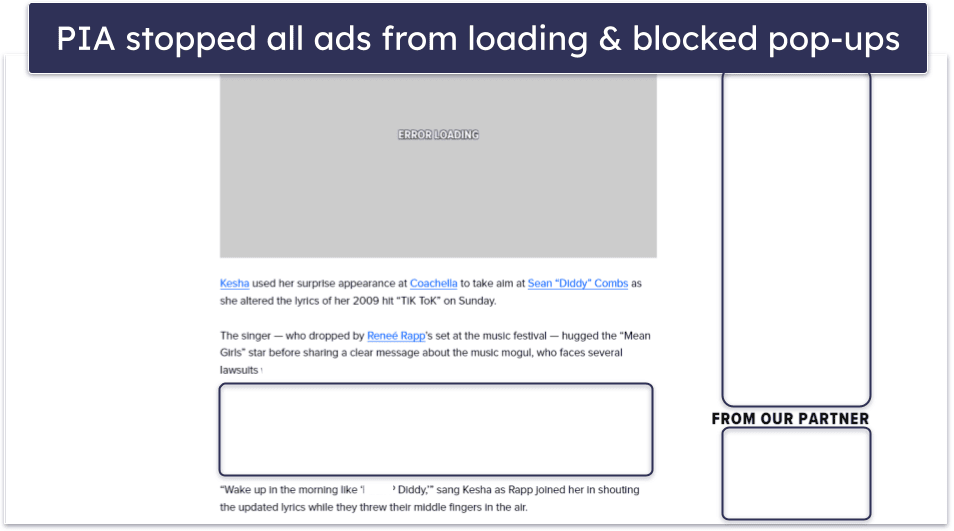
The ad blocker is available on Windows, macOS, and Linux, and you can also get it on Android if you install the .apk version of the Android app (you won’t get PIA MACE if you download the app from the Google Play Store). The feature doesn’t work on iOS, but I like how the provider’s iOS app conveniently redirects you from the settings tab to your iOS Safari settings to enable Safari’s ad blocker.
I tested PIA MACE, and it worked very well. I visited ad-heavy media outlets and social media pages, and PIA MACE prevented all ads from loading on the sites, and it blocked all pop-ups you usually get when you visit these sites. And because there were no more ads on these sites, web pages loaded much faster than usual. I also tested the feature’s malware detection — I tried to visit known suspicious HTTP websites and the tool blocked all of them.
PIA MACE is very similar to ExpressVPN’s ad blocker and Proton VPN’s NetShield tool, but it’s slightly better because, unlike their ad blockers, it doesn’t check trackers against a list before stopping them. Instead, it filters out requests to domains known for serving ads before they can reach your device, so it blocks ads a little faster, which provides better webpage load times. Also, PIA MACE is better than CyberGhost VPN’s ad blocker, which doesn’t consistently block all ads on a web page.
Overall, I think PIA MACE is an excellent VPN ad blocker, as it gets rid of annoying ads and protects you from shady websites.
Multi-Hop (Traffic Obfuscation) — Masks VPN Traffic in Countries That Censor the Internet & on Restricted Networks

PIA’s Multi-Hop feature offers obfuscation that hides your VPN traffic from third parties. The VPN provides obfuscation via Shadowsocks, an encrypted open-source proxy. When you use this feature, your traffic first goes through the Shadowsocks server, which obfuscates it, before reaching the VPN server. This masks your VPN connection and makes it appear like you’re using the internet without a VPN, which is what allows you to overcome VPN blocks. The obfuscation feature is available on Android, Windows, macOS, and Linux.
This tool is great for using in restrictive countries. It’s also good for hiding your VPN connection from your ISP in case you want more privacy. Plus, the feature works really well — PIA is actually #2 on our list of the best VPNs for bypassing censorship in 2025.
Using PIA’s obfuscation tool is pretty simple — you only need to access the Multi-Hop tab, enable it, and pick the Shadowsocks server you want to use. It won’t take you more than 10 seconds to turn it on.
However, using obfuscation will slow down your VPN speeds because an extra layer of encryption is added to the connection. While using obfuscation, my speeds were 10–13% slower on average than without this feature enabled. This isn’t too bad, but it could cause some minor lag or buffering.
On the plus side, PIA lets you pick from Shadowsocks servers in 5+ countries in the US, the UK, Switzerland, the Netherlands, Canada, and Japan. You also get 4 US server locations to choose from, including a server location in Texas and Seattle, as well as its US East and US West server locations. I really like that there’s a quick-connect setting that picks the fastest Shadowsocks server for your location and that PIA displays the ping for each Shadowsocks server, all of which might help you minimize the slowdown.
While I really like PIA’s obfuscation feature, I think ExpressVPN does it better — its proprietary Lightway protocol (which is very secure and fast) automatically provides obfuscation on all of its servers in 105 countries, which is much more convenient and user-friendly because you don’t need to enable any settings. Plus, you can get obfuscation on local and nearby servers, which significantly minimizes the speed loss. And obfuscation is also available on iOS.
PIA’s Multi-Hop includes a SOCKS5 proxy, too, which hides your IP address but doesn’t encrypt your traffic. This is useful for torrenting as SOCKS5 proxies transfer smaller data packets than VPNs, potentially resulting in faster upload and download speeds. They’re also handy when you want to conceal your IP address on a device that doesn’t support VPN traffic, as SOCKS5 proxies can handle all types of traffic. That said, you can use the SOCKS5 proxy in combination with the VPN to route your traffic through 2 servers, which makes it much harder for anyone to track any online activities back to you. But, like with obfuscation, this will slow down your speeds more than a regular VPN connection.
I really like that PIA provides SOCKS5 proxy credentials (username and password) separate from your main account credentials, which adds an additional security measure because they’re isolated from your main PIA account.
Overall, PIA’s obfuscation feature is good for using in restrictive countries and masking your VPN connection from your ISP. Plus, its SOCKS5 proxy is great for boosting your P2P speeds and hiding your IP address on devices that don’t support VPNs.
Smart DNS — Streaming Tool for Gaming Consoles & Smart TVs
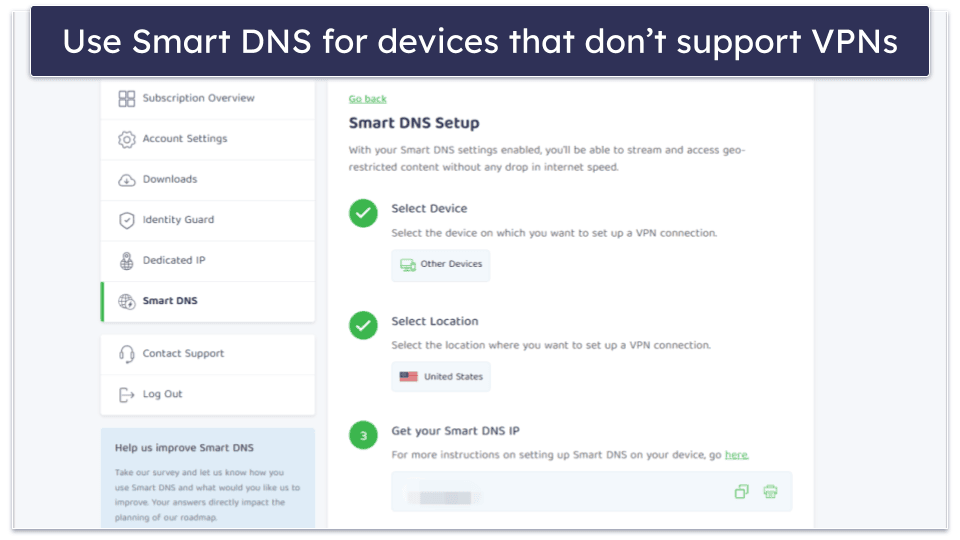
You need to perform a manual setup to use the smart DNS feature, but I like how the provider has easy-to-follow tutorials that show you what you need to do (just like ExpressVPN does). I used the PlayStation 4 tutorial and was able to configure the smart DNS tool on my gaming console in just 5–7 minutes.
I also really like that you can save multiple profiles for different devices. This way, you only have to perform the manual setup once, and your Smart DNS IP will be saved for the future. This is super convenient.
Plus, it works consistently with top sites like Netflix, BBC iPlayer, ITV, Hulu, and Amazon Prime.
Overall, PIA’s smart DNS is easy to set up and good for using the VPN on devices that don’t support VPN apps. While it doesn’t provide privacy, it’s significantly faster than a VPN.
Dedicated IP Addresses — IPs That Are Only Assigned to You

PIA provides dedicated IP addresses that are only assigned to you for a small extra cost. There are dedicated IP addresses for 10 countries, including Australia, Canada, Switzerland, Germany, the UK, Japan, Belgium, Sweden, Singapore, and the US. If you want a dedicated IP address in the US, you can choose between the East and the West, as well as 11 states, such as Washington DC, New York, and Atlanta.
Dedicated IP addresses are useful for avoiding reCAPTCHAs, which are quick tests you need to perform to access certain sites to prove you are human and not a bot (sites often flag shared VPN IPs as suspicious because tons of people are using one IP at the same time). When using PIA’s shared IP addresses, I encountered reCAPTCHAs 50% of the time on Google — but I never saw any when I used a dedicated IP address.
With a dedicated IP, online banking sites are less likely to block your VPN connection (they usually automatically block shared VPN IP addresses). PIA doesn’t have dedicated Romanian IPs, so I couldn’t test this, but my colleague in the US said he had no problem accessing his local bank using a dedicated US IP address.
And I also really like how PIA designed its dedicated IPs to provide better privacy — it uses a token-based system to authenticate ownership of a dedicated IP address, so it never knows which user account the dedicated IP is associated with.
If you’re looking for more options, ExpressVPN offers dedicated IP addresses from 20+ countries, including Hong Kong, South Africa, Spain, and Austria. That said, PIA has dedicated IP addresses in more US locations (10+) than ExpressVPN or other top competitors like CyberGhost VPN, which only offer dedicated IP addresses in 5+ US locations.
Overall, PIA’s dedicated IP addresses work really well, provide very good privacy (PIA doesn’t know which dedicated IP you’re assigned), and are also affordable.
Identity Guard — Monitors if Your Personal Information Is Leaked

I tested Identity Guard, and it worked very well. I tried it with an old email and found that my account had been leaked in 2 different data breaches. The results included the company that suffered the breach, a brief summary of the breach, and my personal information that was exposed (email address, passwords, names, date of birth, etc.).
There’s also an email leak test on PIA’s website, which tells you if your email provider leaks your IP address to your email recipients — you just need to email an address PIA provides you with, and the leak test tool will display the results. The tool works well (though it takes a few minutes to display the results), but I don’t think it’s as good as the Identity Guard feature.
Overall, Identity Guard is great for keeping an eye on your email address, and you can set up alerts to receive an email notification if your email is ever leaked.
Tor Support — Adds an Extra Layer of Security

PIA supports Tor (The Onion Router) over VPN on all of its servers, allowing you to browse .onion sites with an extra layer of security. Although the Tor network is already very secure, using Tor over VPN prevents other Tor users from finding out your real IP address (if your IP address gets leaked, other Tor users will see the VPN’s IP address and not your actual one).
Using PIA’s Tor over VPN feature is very simple — just connect to any PIA server and then begin using the Tor browser (it’s free to download).
But keep in mind that Tor over VPN connections are very slow (in general) — because the Tor network encrypts your traffic multiple times, and adding a VPN connection makes it even slower. In my tests, websites took up to 20 seconds to load and my connection speeds were reduced by 75% when compared to my internet speed without a VPN.
PIA has good Tor support, but I prefer NordVPN’s Onion Over VPN servers — they allow you to browse the Tor network inside regular browsers like Opera, Chrome, and Firefox rather than the Tor browser.
But overall, PIA’s Tor support is great since it’s very easy to use, it works on any server, and it provides an extra layer of protection for users who visit .onion sites on a regular basis.
Private Internet Access Privacy & Security — Transparent & Verified Policies + Open-Source Apps
PIA has a strict no-logs policy — it doesn’t track your IP addresses or your online activity (files you download or websites you visit). Its Privacy Policy states that PIA only stores the data that all VPN services store, including your email address (to communicate with you), payment data (to process refunds), and state and ZIP code data (for fraud detection, payment processes, and to ensure compliance with statutory tax obligations).
PIA’s no-logs policy has been independently audited and proven true, just like other top VPNs, such as ExpressVPN, CyberGhost VPN, and NordVPN. The no-logs policy and PIA’s infrastructure underwent an independent audit by Deloitte (a large security firm) in 2024. The audit’s results confirmed that the provider’s no-logs claims are true.
In addition, PIA publishes regular transparency reports (like CyberGhost VPN) that detail exactly what requests it’s received and how many times it’s complied with an authority’s request for user data. This makes it very easy to trust the VPN.
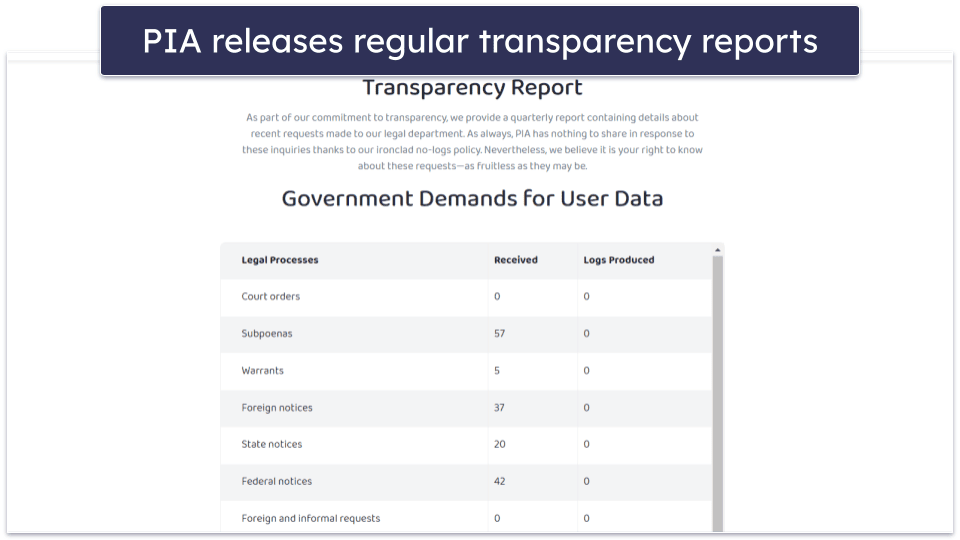
This is one of the only VPNs out there that has open-source apps, meaning anyone can inspect the code for security vulnerabilities. That said, very few people have the technical expertise to actually study the code, so I’d really like to see PIA’s apps undergo independent security audits to prove they are safe to use — Proton VPN also has open-source apps, but they have all passed independent audits.
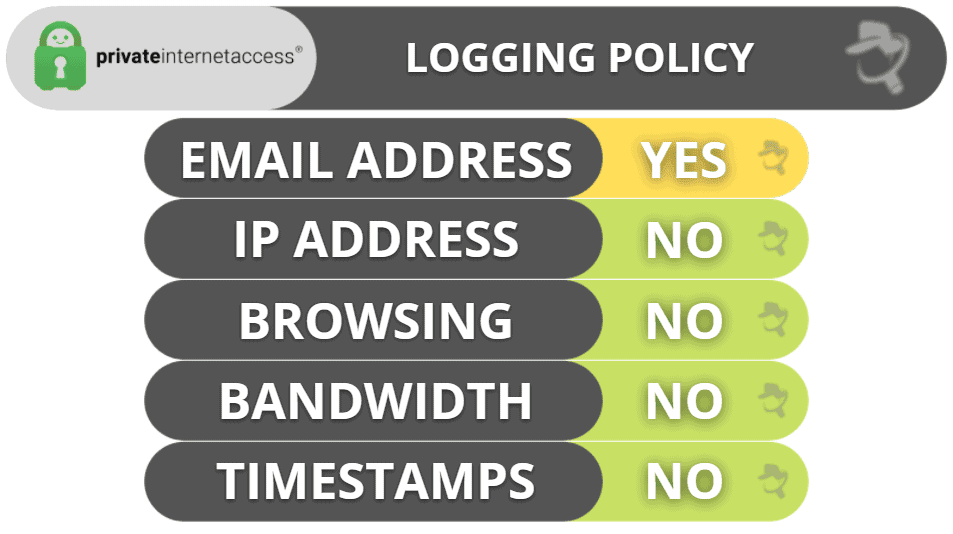
PIA is headquartered in the US, which is part of the 5/9/14 Eyes Alliances (a group of countries that share intelligence data). But since PIA doesn’t keep any logs, it wouldn’t have any user information to hand over if the US government requested it.
Overall, PIA is one of the most transparent VPNs out there — it has a strong no-logs policy, which has been independently audited and tested in court on multiple occasions, it publishes regular transparency reports, and all of its software is fully open-source.
Private Internet Access Speed & Performance — It’s One of the Fastest VPNs in the Industry
I ran speed tests by connecting to a server in all 91 countries where PIA has a server, and on average, I experienced a 67% speed decrease. But I’m from Romania, which has some of the fastest internet speeds in the world, so this speed loss was not as harsh as it looks — I was still able to stream content, download files, and browse the internet at very fast speeds. I asked my colleague in the US to also run speed tests and he reported that his speed loss was an average of 25%, which is better than most other VPNs.
PIA’s very fast speeds don’t come as a surprise, considering that this VPN is ranked #2 on our list of the fastest VPNs in 2025.
I first ran a speed test without being connected to a PIA server to get a baseline for my speeds:
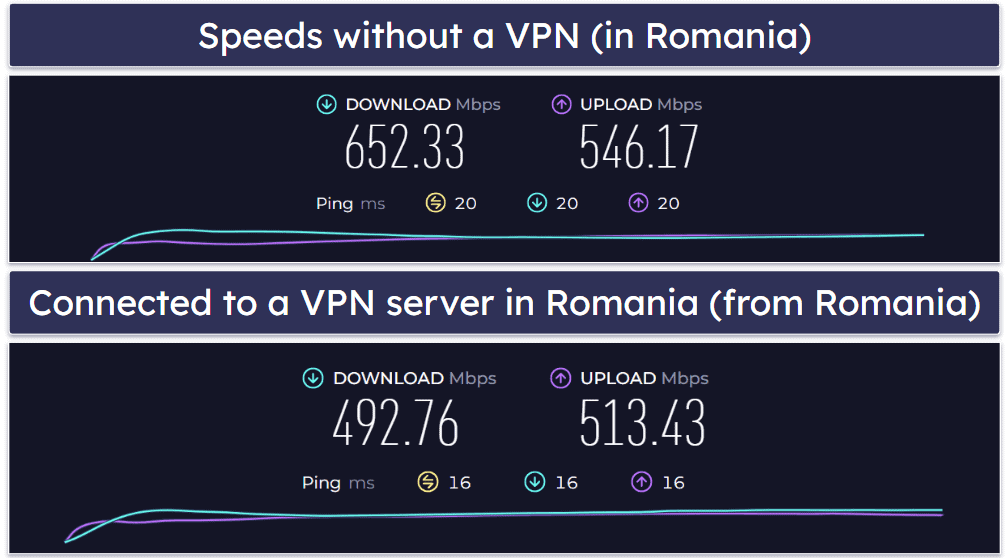
Next, I used PIA’s auto-connect option to connect to the fastest server (and I was instantly connected to a server in Romania). My download speed decreased by 53%, which is a significant drop, but I was able to browse the internet and watch content in HD on Netflix with virtually no delay.
Then, I tested a VPN server in the US. The download speed was 75% slower than my speed without a VPN, and it took 2–3 seconds for videos to load. However, once they began, there were no interruptions. And the torrent speeds were significantly better than the streaming speeds — I downloaded a 20 GB torrent in 24 minutes, which is really fast.
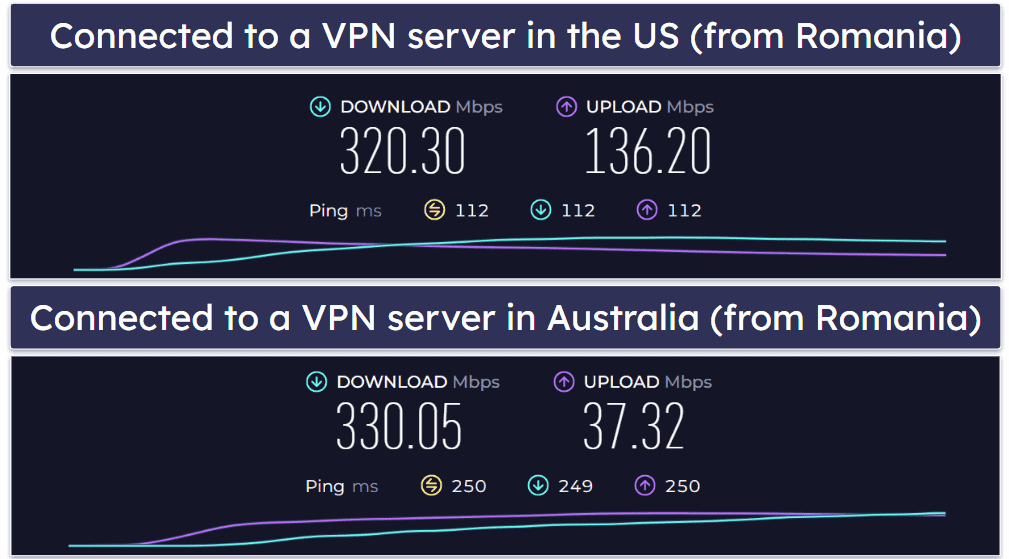
When I tested a server in New Zealand, my speeds were similar to the US server. Websites took 1–2 seconds to load, and videos took up to 3 seconds to load (which was about the same as on US servers), and I didn’t experience any buffering. I was even able to play online games with no lag.
Overall, PIA maintains blazing-fast speeds on local servers and has very good speeds on distant servers. During my tests, I was able to stream content in HD with no buffering, download files with really fast speeds, and play online games with no lag.
Private Internet Access Servers & IP Addresses — Huge Network + Servers in All 50 US States

PIA has servers in 91 countries. While other VPNs have servers in more countries (CyberGhost VPN, ExpressVPN, and Surfshark have servers in 100+ countries), PIA still has a server located in nearly every region of the world, allowing you to connect to a close server no matter where you’re located.
This is also one of the few VPNs with a server in every US state — this helps you access your bank account, circumvent sports blackouts, and watch local news from your home state when you travel in the US. Plus, I like how, for some countries, there are servers in individual cities — this is helpful if you need an IP address from a specific city or if you want to connect to a server that’s closer to you to get faster speeds.
Also, I really like that you can see the server ping (how long it takes for your device to communicate with the VPN server), as this metric helps you find and connect to the fastest servers. It’s also great that PIA color-codes the server ping (green = good ping, while orange = bad ping) so that you instantly know which server to connect to. In my tests, I always had faster speeds when using the servers with the lowest (green) ping.
Geo-located servers are also available in 50+ countries — these are servers that provide you with an IP address from the location you connect to but are located in a different country. PIA provides access to geo-located servers so that users can get IP addresses from countries where hosting physical VPN servers is not doable due to restrictive governments or poor internet infrastructure. I really like how PIA is transparent about the use of geo-located servers, as they are visibly marked inside the VPN app.
PIA supports streaming on dedicated servers in 10+ countries — the US, the UK, Japan, Italy, Sweden, Finland, Canada, Australia, Germany, the Netherlands, and Denmark. These servers are optimized to work with streaming sites. I honestly like ExpressVPN more, as it allows streaming on all of its servers in 105 countries.
PIA allows torrenting across all servers, which makes it easy to use a nearby server for fast downloads — I’m really happy about this because some competitors (like NordVPN) only allow P2P traffic on certain servers.
PIA also offers dedicated IP addresses for a small additional cost. Dedicated IPs are useful because they reduce the risk of being blacklisted by sites that ban VPNs, like bank websites. PIA has dedicated IPs for 10 countries, including the US, the UK, Australia, Canada, and Germany.
Overall, PIA has a really good server network — it has servers all over the world (including a server in every US state), it displays the server ping, all of its servers are P2P-friendly, and it even offers dedicated IP addresses.
Private Internet Access Streaming Support — Works With All of the Popular Apps
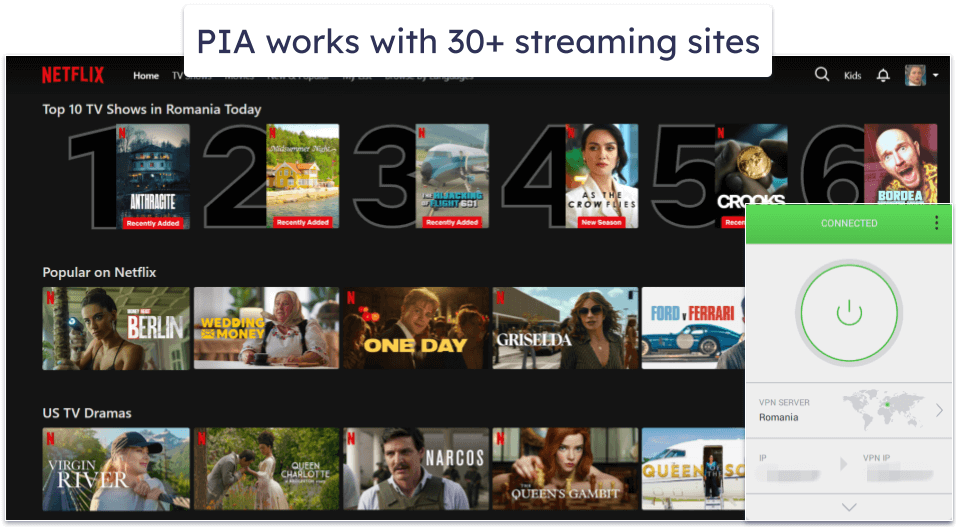
PIA is one of the best VPNs for streaming, as it consistently works with 30+ streaming services (including both well-known and smaller platforms). Streaming is supported on dedicated servers in 10+ countries, including the US, the UK, Japan, Finland, Sweden, Denmark, and Italy. I like the variety, but I think ExpressVPN has much better streaming support, as it supports streaming on all of its servers (which are located in 105 countries) and works with 100+ streaming apps.
The provider has great Netflix support – it works with 7+ Netflix libraries, including Netflix US, Netflix UK, and Netflix Japan. That said, I like ExpressVPN more, as it’s the best Netflix VPN on the market since it works with 10+ Netflix libraries.
In addition to Netflix, PIA also works with other popular streaming platforms like BBC iPlayer, Amazon Prime, Disney+, and Hulu. It also works with smaller streaming services, like Ruutu, YLE, FranceTV, and tv4play. I’m happy that PIA lists all the streaming platforms it works with in a support article, because it provides you with a fast way to find out if the VPN works with a particular site.
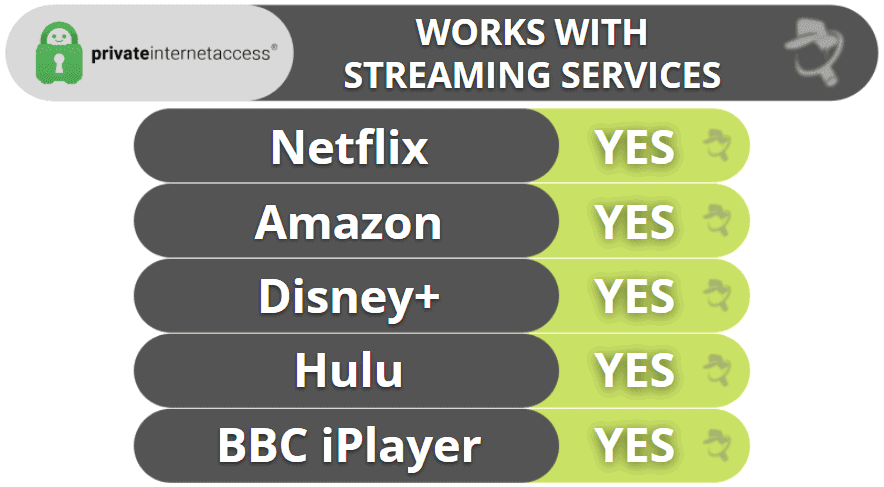
I also like how there’s a smart DNS that lets you use the VPN on devices that don’t support VPN apps, like gaming consoles or some smart TVs — some top competitors, like Proton VPN, don’t come with a smart DNS.
Overall, PIA provides a very good streaming experience — it consistently works with Netflix (including 7+ Netflix libraries), it’s compatible with 30+ streaming platforms (including popular sites like Disney+ and BBC iPlayer), and it even has a smart DNS.
Private Internet Access Torrenting Support — Includes Great Extras (Like SOCKS5 Servers & Port Forwarding)

PIA has really good torrenting support and is actually one of the best P2P VPNs in 2025. It allows P2P traffic on all of its servers, which are located in 91 countries. This is really convenient, as some top VPNs only support P2P downloads on dedicated servers — for example, NordVPN only allows torrenting in 45+ countries.
I tested PIA’s support by downloading multiple torrents using the most popular P2P clients, such as qBittorrent, BitTorrent, and Vuze — it worked with all torrent apps without any issues.
| qBittorrent | ✅ |
| Vuze | ✅ |
| Deluge | ✅ |
| uTorrent | ✅ |
| BitTorrent | ✅ |
| Transmission | ✅ |
Port forwarding is also available, which is great because it allows you to connect to more peers to get faster speeds — my downloads were usually 10–15% faster when I enabled port forwarding. And I like how easy it is to use this feature, as you only need to enable a setting within the VPN app. PIA supports port forwarding across most of its servers, but it’s not available on US servers. I asked the support reps why, and they told me it’s due to legal reasons.
In addition, SOCKS5 proxy support is available, which changes your IP address just like a VPN but doesn’t provide encryption. That way, you get much faster download speeds — for example, it took me just 14–15 minutes to download a 20 GB file on a US server (the same file took 24 minutes to download when I used the VPN connection).
I also like how PIA provides really great security to protect you while torrenting — it comes with a kill switch, a no-logs policy that has been independently audited, and full leak protection (to make sure your data can’t be exposed when you download torrents). I ran leak tests while torrenting on servers in 8+ countries, and I never experienced any leaks. Also, I ran torrent IP leak tests using 3 P2P clients to make sure torrent apps can’t leak my real IP address, and the results always displayed PIA’s IP addresses.
Plus, I’m really happy with PIA MACE — in my tests, it always got rid of annoying pop-up ads on P2P sites (which made them load faster), and it prevented me from accessing shady torrenting sites.
One concern for torrenting with PIA is that it’s based in the US, which has an aggressive stance on copyright infringements because of the Digital Millennium Copyright Act (DMCA), a US law designed to protect the rights of copyright holders. This essentially means that if you accidentally torrent a copyrighted movie, you can face legal consequences under the DMCA. That said, PIA has a strict no-logs policy, which means it won’t be able to share any data even if US authorities request it.
Overall, PIA is a really good VPN for torrenting — it allows P2P traffic on all of its servers, has port forwarding and a SOCKS5 proxy server, and provides high-end security via full leak protection and an ad blocker.
Private Internet Access Gaming Support — Low Ping + DDoS Protection

PIA provides really good gaming support. When I played Counter-Strike 2 on a local server, I had really good ping (18 ms) and fast connections. When I switched to a distant server, my ping increased by a lot (226 ms) — even so, it didn’t affect my gaming sessions, as I didn’t experience any lag and my connections to the gaming server didn’t drop. Plus, it took me about 3 minutes to download a 1 GB update, which is really fast.
And by changing your IP, the VPN prevents DDoS (Distributed Denial of Service) attacks, which can leave you without internet access. Even better, all the provider’s servers come with anti-DDoS protection — so even if someone tries to DDoS you while you’re connected to PIA, they wouldn’t be able to do it.
You can also set up PIA on your router so that you can use it to game on devices that don’t natively support VPN apps, such as Xbox or PlayStation consoles. Helpful step-by-step tutorials are available, which make the whole setup process pretty straightforward — for example, it only took me about 10–11 minutes to set up PIA on my router to use it to play Call of Duty: Modern Warfare III on my PlayStation 5.
Overall, I think PIA is a good pick if you’re only interested in basic gaming since it provides fast gaming on both local and distant servers (despite the high ping), it has anti-DDoS protection, and it works on routers. But if you’re a hardcore gamer, I’d go with ExpressVPN instead because it maintains lower ping on distant servers, provides support for cloud gaming platforms, and even has a router app (and also lets you buy a Wi-Fi router that comes with the app pre-installed on it) — plus, it’s also the best VPN for gaming on the market.
Private Internet Access Bypassing Censorship — Works in China, Iran, Russia & Other Restricted Countries
PIA allows you to circumvent restrictions in countries that censor the internet, such as China, Iran, Russia, Saudi Arabia, and Indonesia, because it uses obfuscation to hide your VPN traffic. PIA claims it works in those restrictive countries and any other country that censors the internet.
If that doesn’t work, PIA lets you enable the TCP port 443 with the OpenVPN protocol. This port is crucial for HTTPS traffic, which is secure web traffic, meaning it’s difficult for authorities to block without causing significant disruptions to general internet access. This also helps you avoid obfuscation, which typically reduces your connection speed more than a standard encrypted VPN connection.
It’s also great that PIA has servers in most parts of the world, allowing users in restrictive countries to use nearby servers to get fast speeds.
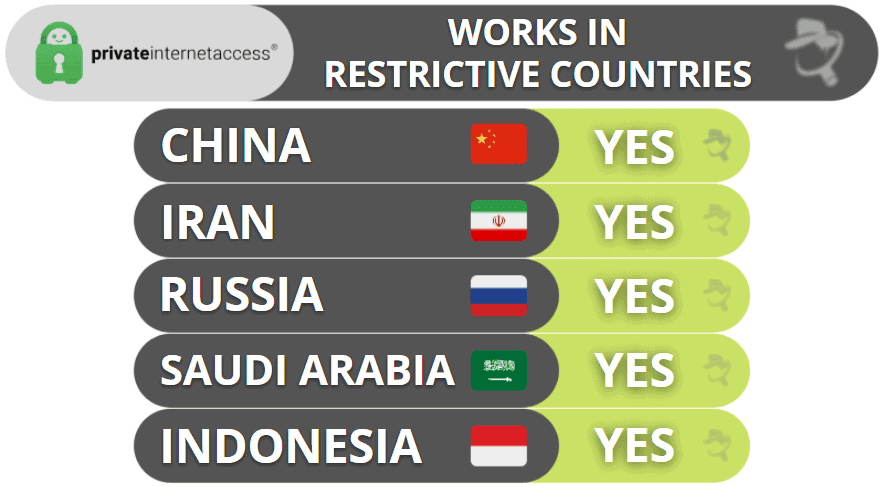
Private Internet Access Ease of Use: Mobile & Desktop Apps — Offers User-Friendly Apps
PIA has apps for iOS, Android, Windows, macOS, Linux, Apple TV, and Android TV. I easily installed the Android and iOS apps in 1 minute, and it took about 2 minutes to install the Windows and macOS apps.
How to Install Private Internet Access (Just 3 Easy Steps):
- Sign up for PIA. Pick the plan that fits your budget.
- Download and install the VPN app. Just follow the on-screen instructions.
- Run the VPN app. Then, connect to a server with 1 click and surf the web securely.
Android — Customizable & Secure

I really like PIA’s Android app — it works just as promised, it’s feature-rich, and it’s easy to navigate. I especially like how you can connect to a server with one tap of the large power button on the main window. If you want to manually connect to a server, all you have to do is tap on your current server location to find the full list of server locations (you can also filter servers by favorites, latency, and name to help save you some time).
PIA’s Android app is very flexible and customizable. You can easily change protocols (OpenVPN or WireGuard), encryption levels, proxy settings, and connection options (like whether to connect to trusted or untrusted Wi-Fi networks). You can also enable/disable port forwarding, change the look and layout of the app, and do a lot more.
I like how all features are set to a recommended default setting so that beginners don’t feel overwhelmed and you don’t have to worry about changing them. Also, I love the brief description for most of the settings.
PIA has its own private/incognito web browser for Android and iOS devices called InBrowser (you have to install it through the Google Play Store) — it wipes all sessions, cookies, and browser history whenever you close the app. Though I would appreciate a security update, as it was last updated way back in 2023.
Overall, PIA has a very good Android app — it’s simple to use, fast, and offers a lot of customization options for advanced users.
iOS — Offers 3 Protocols + a Kill Switch & Siri Shortcut

PIA’s iOS app has a similar design to the Android app, so it’s really easy to switch between these apps. But unlike the Android app which lets you choose between OpenVPN and WireGuard, the iOS app has 3 protocols instead of 2 — IKEv2/IPSec, OpenVPN, and WireGuard. However, the iOS app is missing PIA MACE, split-tunneling, and obfuscation.
I really like that PIA’s iOS app has a built-in kill switch, as many of the top VPNs (like PrivateVPN and VyprVPN) don’t offer a kill switch with their iOS apps.
One of my favorite features in the iOS app is the Siri shortcut. You can link your PIA app on iOS to Siri and connect and disconnect from the VPN with pre-recorded phrases, which is really convenient.
Overall, PIA’s iOS app is secure and user-friendly, with many of the same features as the Android app (with minor differences).
Windows/Mac (Desktop) — Feature-Rich & Easy to Navigate
I really like PIA’s desktop apps — they have intuitive interfaces and are similar to the iOS and Android apps. PIA is one of the few VPNs that include split-tunneling on macOS and it’s available on macOS 11 and above. This is great because a lot of top VPNs like CyberGhost VPN and NordVPN don’t offer split-tunneling on Mac devices. Even the few VPNs that do allow split-tunneling on macOS devices, like ExpressVPN, only let you split-tunnel traffic on macOS version 10 and below.
You connect to a server by pressing one big on/off button. If you don’t choose a server, this button will connect you to the fastest server, which is usually the nearest server. Accessing the full list of servers from here is really easy — all you have to do is click on the VPN server section.

By pressing a slider, you can access extra options. I find the quick-connect section really handy — it lists the last 6 servers you connected to, so you can easily reconnect to the same location with just one click. There’s also a separate section for the Snooze feature, which lets you pause the VPN connection for a predetermined amount of time (1–30 minutes) before it reconnects you to the server again.

My favorite is the quick-setting section, where you can enable/disable features (green = enabled; gray = disabled) like MACE, port forwarding, LAN connections, desktop notifications, and choose between light and dark modes with a click.
And I think it’s great that PIA displays a lot of connection details on the main window. You can check your download and upload usage, your VPN IP address, the VPN protocol, and the encryption level, as well as your connection’s performance.
Plus, all widgets in PIA’s expanded display are movable, so you can put the widgets you frequently use at the top.
I like that PIA’s desktop apps have automation settings that tell the VPN what to do when you use a secure/unsecured WiFi or wired connection (connect or disconnect). This is convenient because you can configure PIA to automatically connect to a server when you access unsecured Wi-Fi networks.
Overall, PIA has great desktop apps. They’re both feature-rich and very easy to use.
Apple TV — Available for tvOS 17+
PIA has a dedicated app for Apple TV that works for modes using tvOS 17 and above. This means that users with the latest generation of Apple TV HD and Apple TV 4K can download a PIA app directly from the Apple TV App Store.
The app is pretty simple to navigate with a remote. PIA organizes its server locations by country, so all you have to do is scroll down through the list to find a server location to connect to it. There’s also a search function you can use to find a specific location.
PIA offers the option to use a dedicated IP address on Apple TV, which is available in countries such as Australia, Belgium, Canada, Germany, Japan, Singapore, Sweden, Switzerland, the UK, and the US. This means you won’t have to deal with annoying CAPTCHAs when browsing on your Apple TV.
PIA uses the IKEv2 protocol on its Apple TV app, which is secure and offers decent speeds for streaming in HD on an Apple TV. That said, ExpressVPN uses its proprietary Lightway protocol on its Apple TV app, which is much faster than IKEv2 and most other VPN protocols on the market.
Overall, PIA’s Apple TV app is user-friendly and a great way to securely stream on your Apple TV. It provides reliable connections for streaming and you can even get a dedicated IP address for uninterrupted browsing on your Apple TV.
Browser Extensions (Chrome/Opera/Firefox) — Secure & Intuitive

PIA’s browser extensions are feature-rich and user-friendly. The design is the same for all browsers — you get a main display and an expanded display (similar to the desktop apps) for quick access to the full server list and settings.
The extensions come with some really good extra security features. I’m really happy to see that PIA can automatically convert HTTP connections (which are unencrypted) into safer HTTPS connections whenever possible. And I really like that it has WebRTC leak protection, which prevents your IP address from leaking — I ran 10+ leak tests, and PIA never revealed my IP address.
I was impressed with the extra privacy features that come with PIA’s extensions. You can set up the VPN to automatically block sites from accessing your camera, location, and microphone, and stop your browser from auto-filling credit card and address information to prevent sharing any personal data via hidden fields.
On top of that, the extensions have features that prevent tracking. You can disable third-party cookies that track your activities, website referring (won’t send the address of the web page you’re currently on when following a link), and hyperlink auditing so trackers won’t know that you clicked on a certain link. There are also options to remove UTM parameters that are used to track information about the sites you visit, and FBCLID parameters, which are used to track information about the sites you visit after clicking on an outgoing link on Facebook.
The extensions also offer additional features like Bypass List, which lets you exclude websites from the PIA extension connection, and Smart Location, which enables you to connect to a specific server based on the URL you visit, making it easy to use the extension in different locations.
Routers — Provides Tutorials to Configure the VPN to Your Router
You can manually configure PIA on your router, but only if it’s compatible with the provider’s VPN service. The good news is that PIA works with several top router firmware, such as AsusWRT and DD-WRT — some top competitors, like TunnelBear, don’t support router setups at all.
Step-by-step tutorials are available (that even include screenshots), which make the setup process pretty straightforward. By following such a tutorial, I was able to configure PIA on my router in just 13–15 minutes.
That said, I think ExpressVPN is a better option if you’re interested in using a VPN on your router — it’s one of the only VPNs on the market that has a dedicated router app, which is very easy to install and use. Plus, the router app uses the provider’s proprietary Lightway protocol, which provides the fastest VPN speeds on the market.
Overall, PIA supports setups on popular router firmwares and provides access to helpful configuration guides.
Private Internet Access’s Apps: Is Private Internet Access Easy to Use?
PIA has user-friendly apps for Android, iOS, Windows, macOS, Linux, and Apple TV. They all have a similar design and are easy to navigate, and all of PIA’s apps are fully open-source. The desktop and Android apps are the most feature-rich, as the iOS app is missing obfuscation and PIA MACE — that said, the iOS app still provides a lot of customization, convenient features, and advanced tools. The only PIA app that doesn’t offer lots of settings is the Apple TV app, but this makes it super simple to navigate, especially with a remote.
| Android | iOS | Windows | macOS | Linux | Apple TV |
|
| Graphical User Interface (GUI) | ✅ | ✅ | ✅ | ✅ | ✅ | ✅ |
| Kill Switch | ✅ | ✅ | ✅ | ✅ | ✅ | ❌ |
| Split-Tunneling | ✅ | ❌ | ✅ | ✅ | ✅ | ❌ |
| PIA MACE | ✅ (only in the .apk app) |
❌ | ✅ | ✅ | ✅ | ❌ |
| Traffic Obfuscation | ✅ | ❌ | ✅ | ✅ | ✅ | ❌ |
| Automation | ✅ | ✅ | ✅ | ✅ | ✅ | ❌ |
Private Internet Access Customer Support — Offers Live Chat & Email Support + Guides
PIA offers excellent customer support through various channels, including comprehensive troubleshooting guides, a detailed FAQ section, 24/7 live chat, and email support. However, it’s worth noting that PIA does not provide phone support, which may be a drawback for those who prefer direct telephone assistance.

The VPN offers comprehensive setup guides explaining how to install all of PIA’s apps and tackle potential problems. The layout is intuitive and enhanced with clear screenshots, and I think it’s really great that there are 100+ FAQs available, which will answer most of your questions.
I had an OK experience with the provider’s live chat support — it never took more than 10 seconds to connect to a live agent, and most reps I talked to were able to answer my questions. When I had connection issues with PIA (my app wouldn’t connect to a server), the rep I was connected with knew exactly what to do. But, I wasn’t happy that many of the live agents I talked to weren’t very knowledgeable.
The other thing I didn’t like about PIA’s live chat is that sometimes, the live chat button on the website was missing. I was still able to get in touch with its live chat agents 95% of the time, but this can be annoying, especially if you need help with something urgent.
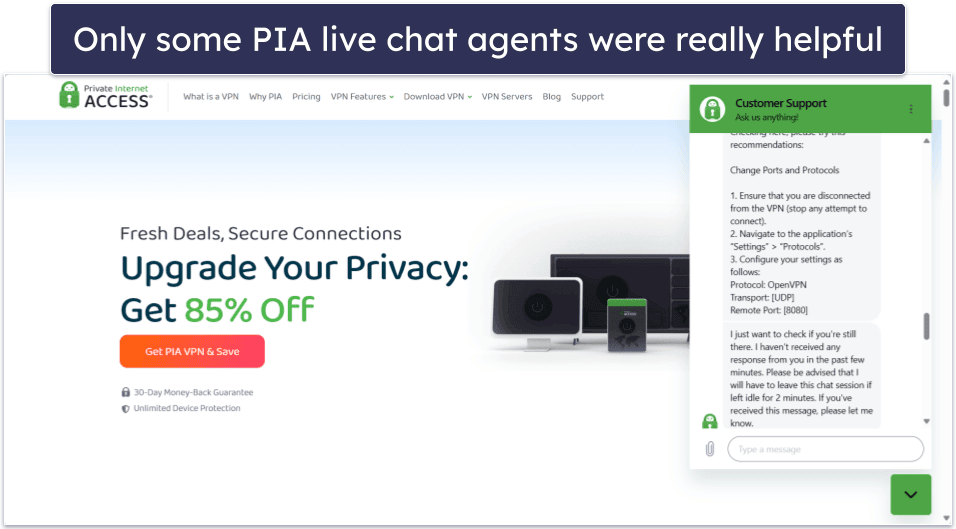
The email assistance was much better. I sent numerous queries over the course of a week, and support representatives typically responded within a 24-hour time frame with useful replies.
Overall, PIA has really good support. There are useful setup and troubleshooting guides along with in-depth FAQs, and the email support is pretty helpful — but I’d like to see PIA improve its live chat support in the near future.
Additional Tools on the Site — Offers DNS, IPv6 & Email Leak Tests
PIA offers a couple of tools on its site, free of charge, aimed at enhancing your online privacy and security:
- DNS and IPv6 leak tests. These tools ensure that your VPN shields your true IP address effectively. The DNS leak test checks if your DNS queries — essentially the sites you visit — are coming from the IP address provided by the VPN, which should be the case to ensure your activity is private. Similarly, the IPv6 leak test assesses whether your system can connect using an IPv6 address and ensures that this address is also routed through the VPN.
- Email leak test. This test checks if your email provider is exposing the IP address assigned by your VPN to recipients of your emails. This is important if you want to maintain your anonymity and privacy while communicating via email, especially when discussing sensitive information or connecting from locations where internet use is monitored or restricted.
- What’s my IP? This tool helps you confirm that your VPN is functioning correctly. It’s an instant check to ensure that your real IP address is hidden and that you appear to be browsing from your chosen VPN server’s location.
What Private Internet Access Can Do Better — Improve Live Chat + Access More Streaming Apps
Private Internet Access is one of the best VPNs on the market, but it’s not perfect. While I don’t have any big complaints, there are a couple of things I hope it’ll improve in the future.
The main area that needs improvement is live chat, which provides assistance in real-time. Though PIA’s reps are friendly, most of the ones I have communicated with can only answer very basic questions — you can easily find these same answers on the website.
In contrast, live chat reps from other VPNs, like ExpressVPN, can answer more complex questions. This is really convenient if you’re having a technical issue that you want resolved right away. The lack of knowledgeable live chat reps means you’re stuck waiting up to 24 hours for an email response from a technical support rep.
PIA has pretty good streaming support, as it works with all of the most popular platforms, including Netflix, Disney+, and Amazon Prime, and works with 30+ platforms. However, top competitors work with many more (for example, ExpressVPN works with 100+ streaming sites, and CyberGhost VPN works with 50+.
I really appreciate that PIA offers an obfuscation feature that actually works in restrictive countries like China. Most of the VPNs that offer this type of feature still don’t work well in places where the government uses sophisticated blocking techniques. But it’s not very convenient that you can only connect to 5+ countries to obfuscate your traffic as it means you may not always be able to connect to a nearby server for the best possible speeds.
Lastly, PIA works with many top router brands, but you have to manually configure the VPN to the router. While PIA provides very good guides to complete the process, it’s nowhere as easy as it is with ExpressVPN — it includes a native router app, which you can install and configure with fewer steps and simplicity.
Is Private Internet Access One of the Best VPNs Out There?
PIA is really fast, very user-friendly, and also has high-end security features, including an independently audited no-logs policy (that’s also been proven true in court) and open-source apps.
The VPN has essential security features and extras that other VPNs lack, including split-tunneling, one of the best VPN ad blockers on the market, traffic obfuscation, and more. Plus, it has advanced features like full leak protection, RAM-only servers, and perfect forward secrecy.
And PIA provides a really good streaming and gaming experience, and it’s one of the best torrenting VPNs on the market, as it allows P2P traffic on all servers, works with top P2P apps, and has support for port forwarding and SOCKS5 connections.
But there is one issue I need to mention — most of PIA’s live chat agents aren’t very knowledgeable, which is inconvenient.
But, overall, PIA is still one of the best VPNs out there. It also allows unlimited simultaneous connections, it’s one of the cheapest VPNs on the market, and all of its plans are backed by a 30-day money-back guarantee.
Frequently Asked Questions
Can Private Internet Access be trusted?
Yes, Private Internet Access is really trustworthy. While it’s based in the US, which is a member of the 5/9/14 Eyes Alliances (a group of countries that share intelligence data), it’s easy to trust this VPN because its no-logs policy has been independently audited and also proven true in court on many occasions, it releases regular transparency reports, and all of its apps are open-source, so anyone can inspect the code for security issues.
Will Private Internet Access work in China?
Yes, Private Internet Access works in China. PIA offers obfuscation through Shadowsocks, and its reps confirmed that it’s able to consistently work in China and other restrictive countries.
If you’re having trouble with the obfuscation feature while in China (which you shouldn’t), you can try enabling the TCP port 443 with the OpenVPN protocol, which is harder for governments to effectively block.
Does Private Internet Access work with Netflix?
Yes, Private Internet Access works with Netflix. By using dedicated streaming servers, you can watch Netflix in 7+ countries, including the US, UK, Japan, Italy, Denmark, and Germany. In addition, PIA is compatible with 30+ other streaming services, including top platforms like Hulu, Amazon Prime, Disney+, and BBC iPlayer.
Is Private Internet Access good for torrenting?
Yes, in fact, Private Internet Access is one of the best VPNs for torrenting in 2025 — it supports torrenting on servers in 91 countries, works with top P2P clients like uTorrent and qBittorrent, and has support for port forwarding and SOCKS5, which are P2P-related features that increase your download speeds.
In addition, it provides excellent security while torrenting — it has industry-standard security features, including a kill switch on all platforms and a no-logs policy that has been audited and proven true in court. Also, full leak protection is available, and there’s even an ad blocker that protects you from malicious ads on P2P sites and shady torrent trackers.
Is Private Internet Access free?
No, Private Internet Access doesn’t come with a free plan, but its plans are very affordable, and it even backs each purchase with a 30-day money-back guarantee, so you can test the VPN risk-free.
Does Private Internet Access have fast speeds?
Yes, Private Internet Access provides some of the fastest speeds on the market — in my tests, HD videos loaded very fast on both local and distant servers, and I never experienced any buffering. Plus, I was able to download large files really fast and game with no lag. PIA achieves these speeds because it has servers in most parts of the world (so it’s easy to use a nearby server for fast speeds) and because it uses fast VPN protocols like WireGuard.
But even so, PIA still isn’t as fast as ExpressVPN, which is the fastest VPN in 2025 thanks to its proprietary Lightway protocol, which provides lightning-fast speeds (and is also extremely secure and open-source).
Does Private Internet Access have a kill switch?
Yes, Private Internet Access offers a kill switch for its iOS, macOS, Windows, and Linux apps. PIA doesn’t have a kill switch feature for Android, but this is because the Android operating system has a much better feature — the ability to block an internet connection without a VPN. This provides system-level protection, and PIA has chosen not to allow you to connect on the app level.
Can I install Private Internet Access on my router?
You can set up Private Internet Access on your router, but you’ll need to perform a manual setup. Fortunately, PIA has very helpful tutorials (that even include screenshots), which make the manual setup pretty straightforward — on average, it shouldn’t take you more than 15 minutes to do it.
But if you mostly want to use a VPN on your router, I recommend ExpressVPN instead because it’s one of the only VPNs on the market that has a dedicated router app, which you can quickly install on compatible routers — plus, the router app is very easy to use, as the design is similar to ExpressVPN’s other apps.
What devices are compatible with PIA?
PIA has dedicated apps for a wide range of devices, including:
- Android smartphones and tablets running 5.1 (Lollipop) and higher.
- iPhones, iPads, and iPods running iOS 12.1 and newer.
- PCs (personal computers) running Windows 8.1 or higher.
- PCs running macOS 10.14 and higher.
- PCs running Linux distros, including Ubuntu 18.04+ (LTS), Mint, Debian, Fedora, and Arch.
- Android TV devices running 5.1 (Lollipop) and higher.
- Apple TV devices running tvOS 17 and higher.
- Chrome, Firefox, and Edge browsers.
PIA also works with routers and Amazon Fire Stick devices (2nd Gen and higher), but it doesn’t have dedicated apps for them. If you want to get PIA on your router, you’ll have to perform a manual setup. To use PIA on your Amazon Fire Stick device, you can sideload its Android app.
For devices that don’t support VPNs, you can use PIA’s smart DNS tool. These include:
- Gaming consoles like PlayStation 4 and 5, Xbox S, Xbox One, Xbox Series X, Nintendo Switch, and Amazon Luna.
- Smart TVs like Apple TV, LG Smart TV, Samsung TV, and Nvidia Shield TV.
- Chromecast.
- Roku.
How much does PIA VPN cost?
Private Internet Access’s plans start as low as $2.03 / month, which is very affordable for a top VPN. Its 2-year subscription plan, its longest-term plan, offers the best value and comes with 4 extra months for free. It also has a 1-month plan that costs $11.99 / month and a 6 month plan that costs $7.50 / month. All of its plans come with a 30-day money-back guarantee.
Does PIA have an ad blocker?
Yes, PIA includes an ad blocker called MACE, which is one of the best VPN ad blockers on the market. PIA’s MACE blocks ads, trackers, and malicious websites, and in my tests, it did everything it’s supposed to — it blocked all ads on every site I visited, including ad-heavy sites like HuffPost, and it always flagged shady sites.
PIA’s MACE is available on all supported platforms, including the browser extensions, and it only takes 1 click to enable it in any of PIA’s apps.

